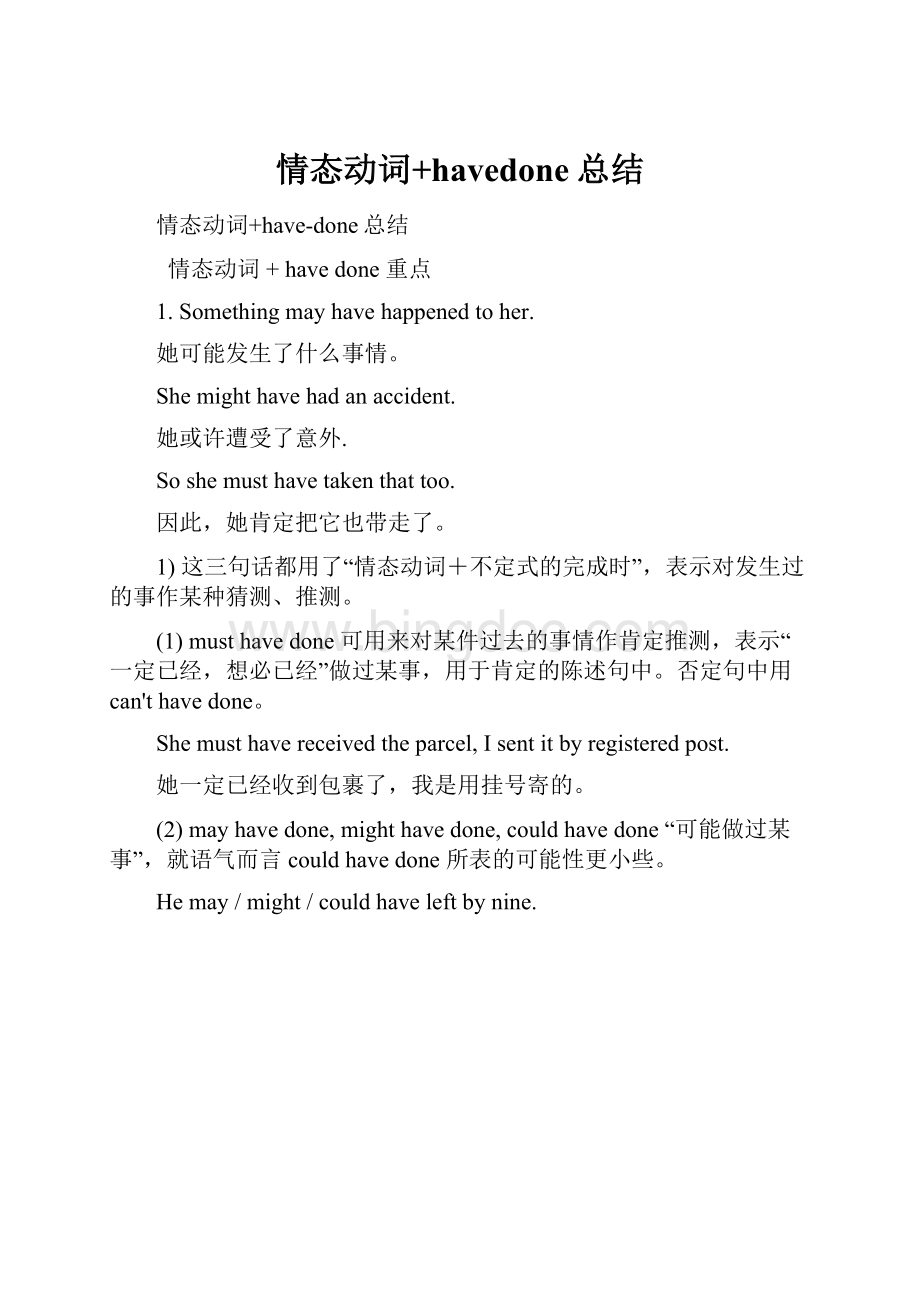情态动词+havedone总结.docx
《情态动词+havedone总结.docx》由会员分享,可在线阅读,更多相关《情态动词+havedone总结.docx(12页珍藏版)》请在冰点文库上搜索。

情态动词+havedone总结
情态动词+have-done总结
情态动词+havedone重点
1.Somethingmayhavehappenedtoher.
她可能发生了什么事情。
Shemighthavehadanaccident.
她或许遭受了意外.
Soshemusthavetakenthattoo.
因此,她肯定把它也带走了。
1)这三句话都用了“情态动词+不定式的完成时”,表示对发生过的事作某种猜测、推测。
(1)musthavedone可用来对某件过去的事情作肯定推测,表示“一定已经,想必已经”做过某事,用于肯定的陈述句中。
否定句中用can'thavedone。
Shemusthavereceivedtheparcel,Isentitbyregisteredpost.
她一定已经收到包裹了,我是用挂号寄的。
(2)mayhavedone,mighthavedone,couldhavedone“可能做过某事”,就语气而言couldhavedone所表的可能性更小些。
Hemay/might/couldhaveleftbynine.
未做。
”其否定结构needn'thavedone表示“过去本没必要做某事却做了。
”
4.could(不能用can)havedone表示“过去本能够做某事却未做。
”注意:
其否定形式couldn'thavedone没有虚拟语气的用法,couldn'thavedone只能表推测,相当于can'thavedone,意为:
“过去不可能做了某事。
”
5.might(不能用may)havedone表示“过去本可以做某事却未做。
”注意:
其否定形式mightnothavedone没有虚拟语气的用法,mightnothavedone只能表推测,相当于maynothavedone,意为:
“过去可能没有做某事。
”
二、表推测的用法
1.musthavedone
表示对过去某事的肯定猜测,译为:
过去肯定做了某事。
不存在mustn'thavedone的形式。
其否定或疑问形式须用can(could)来表示.例如:
Sincetheroadiswet,itmusthaverainedlastnight.既然路是湿的,那昨天晚上肯定下雨了。
Hecan'thavemissedtheway.Idrewhimamap.他不可能迷路。
我(当时)给他画了张图。
“Thedictionaryhasdisappeared.Whocouldhavetakenit?
”词典不见了,(过去)谁可能把它拿走了?
2.may/mighthavedone
may/mighthavedone表示“过去可能做了某事”。
may比might表示的可能性在说话人看来稍大些。
may/mightnothavedone表示“过去可能没有做某事。
”例如:
Ican'tfindmykeys.Imay/mighthaveleftthemattheschoolyesterday.我找不到我的钥匙了。
我可能昨天把他们落在学校了。
Johnmay/mightnothavepassedtheexam;helooksverysad.约翰可能没有通过考试。
他看起来很忧伤。
注意:
may/mighthavedone表推测不能用于疑问句中。
3.can/couldhavedone表推测一般用在否定句和疑问句中,表示不相信或怀疑的态度。
Can/Couldhehavepassedtheexam?
他可能通过了考试吗?
Ithinkthathecouldn’t/can'thavegoneabroad.Isawhimjustnow.我认为他不可能出国了。
我刚才还看见他了。
注:
表示推测过去某动作发生的可能性时,就表示的可能性程度而言,must最大,could其次,may更次之,might最小。
例如:
“IwonderhowTomknewaboutyourpast.”“我想知道汤姆是怎么知道你的过去的。
”“Hemust/could/may/mighthaveheardofitfromMary.”
“他肯定/很可能/可能/兴许(没准儿)已从玛丽那儿听说此事了。
”
“情态动词+havedone”考点解析
“情态动词+havedone”结构是重要考点,也是较难掌握的语法项目之一,为了帮助同学们更好地掌握使用这一考点,下面结合近年高考试题谈谈其主要用法。
考点之一:
在虚拟条件句中,如果表示与过去事实相反的情况,从句中用过去完成时,而主句中则用“情态动词+现在完成时”,即:
would/could/should/mighthavedone。
例如:
Iftheyhadfinishedtheworkontime,theywouldhavebeenpraisedbythemanager.
Ifyouhadworkedhard,youcouldhavepassedtheexamination.
考题分析:
1.Ifit___forthesnow,we___themountainyesterday.
A.werenot;couldhaveclimbedB.werenot;could
C.hadnotbeen;couldhaveclimbedD.hadnotbeen;couldclimb
2.---IstayedatahotelwhileinNewYork.---Oh,didyou?
You___withBarbara.
A.couldhavestayB.couldstayC.wouldstayD.musthavestay
3.YesterdayJanewalkedawayfordiscussion,otherwise,she___somethingshewouldregretlater.
A.hadsaidB.saidC.mightsayD.mighthavesaid
答案简析:
1.根据信息词yesterday可以判断该句是表示与过去事实相反的虚拟条件句,从句中应该用“情态动词+现在完成时”,故答案选C。
2.本句是一个含蓄虚拟条件句,意思是:
Ifyouhadn’tstayatahotelwhileinNewYork,youcouldhavestayedwithBarbara.表达了与过去事实相反的情况,答案选A。
3.本句考查的也是含蓄虚拟语气,意思是:
如果她参加了讨论,她可能会说出一些后来令她后悔的话。
表达了与过去事实相反的情况,故答案选D。
考点之二:
musthavedone表示对过去已经发生过的情况的肯定推测判断,语气较强,意思是“一定……、肯定……”。
其否定形式分别用can’t/couldn’t和can/could。
例如:
Itmusthaverainedlastnight,forthegroundiswetthismorning.
昨天晚上一定是下雨了,因为今晨地面是潮湿的。
Shedidn’tattendthelessonyesterday.Shemusthavebeenill.
她昨天没有上课,她一定是生病了。
1.Musthavedone语气极强,表示非常肯定,一定做了某事,基本只用肯定句
巩固练习.
He____havecompletedhiswork,otherwise,hewouldn’tbeenjoyinghimselfbytheseaside.
A.shouldB.mustC.wouldn’tD.can’t
Thiscakeisverysweet.You___alotofsugarinit.
A.ShouldputB.couldhaveputC.mightputD.musthaveput
Iwasonthehighwaywhenthiscarwentpastfollowedbyapolicecar.They___atleast150kilometersanhour.
A.shouldhavebeendoingB.musthavebeendoing
C.couldhavedoneD.wouldhavedone
Ididn’thearthephone.I____asleep.
A.mustbeB.musthavebeenC.shouldbeD.shouldhavebeen
2.may/mighthavedone也用于对已经发生过的情况的肯定推测判断,但语气稍弱,意思是“可能,或许……”。
例如:
Shedidn’tgetthereintime.Shemayhavemissedthebus.
她没能及时到达那儿。
她可能没赶上汽车。
Hedidn’tcometoschooltoday.Hemighthavebeenill.
他今天没来上课,他可能病了。
巩固练习:
1.Sorry,I’mlate.I____haveturnedoffthealarmclockandgonebacktosleepagain.(
A.mightB.shouldC.canD.will
2.Thewindowwasbroken.Tom____havedonethat,forhewasalittlenaughty.
A.couldB.mightC.shouldD.oughtto
3.Yesterday,Janewalkedawayfromthediscussion.Otherwise,she___somethingshewouldregretlater.
A.hadsaidB.saidC.mightsayD.mighthavesaid
答案简析:
这三句表达的都是对过去已经发生过的情况的推测判断,意思是“可能、或许……”,应该用may/mighthavedone结构。
答案分别选ABD。
3.如果对过去情况推测判断的句子是疑问句和否定句,只能用can/could和can’t,/couldn’t。
例如:
Hecan’thavegoneabroad;Isawhimanhourago.
他不可能去国外,我一个小时前还见到他呢。
---Canhehavepassedtheexam?
---No,hecan’thave.Hedidn’tworkhard.
他通过考试了吗?
不,他不可能通过考试。
他学习不努力。
巩固练习:
1. ---Therewerealreadyfivepeopleinthecarbuttheymanagedtotakemeaswell.
---It___acomfortablejourney.
A.can’tbeB.shouldn’tbeC.mustn’thavebeenD.couldn’thavebeen
2. MysistermethimattheGrandTheatreyesterday,sohe____yourlecture.
A.couldn’thaveattendedB.needn’thaveattended
C.mustn’thaveattendedD.shouldn’thaveattended
3.MyEnglish-Chinesedictionaryhasdisappeared.Who___havetakenit?
A.shouldB.mustC.couldD.would
4.Ididn’tseeherinthemeeting-roomthismorning.She____atthemeeting.(1995上海)
A.mustn’thavespokenB.shouldn’thavespoken
C.needn’thavespokenD.couldn’thavespoken
答案简析:
1、根据Theywerealreadyfivepeopleinthecar,buttheymanagedtotakemeaswell.一句中的时态,应该是对过去情况的推测判断,因为车上已经有5位人了,在带上我一个,可以断定这一定是一次不舒适的旅行。
所以,本句表达的是对过去否定的推测判断,应该用can’t/couldhavedone来表达。
故答案选D。
2、根据句意“我妹妹昨天在大剧院见过他”,所以,一定是对过去已经发生的否定的判断,答案选A。
3、本句表达的是对过去发生过的情况的疑问,所以应该用couldhavedone,答案选C。
4、本句表达的是过去已发生情况否定的推测判断,应该用couldn’thavedone,故答案选D。
4.含有must/may/might表示对过去情况推测判断的句子,如果变成反意疑问句,反意疑问句中动词应与情态动词must等后的动词形式保持一致,用一般过去时或现在完成时。
例如:
Hemusthavebeenlivinghereforyears,hasn’the?
他一定是在这儿住了好几年了,是吗?
Youcan’thavesleptwelllastnight,didyou?
你昨天晚上没睡好,是不是?
巩固练习:
1:
Greatchangesmusthavetakenplaceinthevillageinthepastfewyears,____they?
A.mustn’tB.haven’ttheyC.can’tD.didn’t
2.Hemusthavelivedahappyafewyearsago,____he?
A.didn’tB.hasn’tC.mustn’tD.can’t
答案简析:
1.含有must表示推测判断的句子,其反意疑问句的动词形式应与must后动词时态保持
一致。
可以理解成如果不表示推测判断,该句应该说成:
Greatchangeshavetakenplaceinthevillageinthepastfewyear.变成反意疑问句后应该说成:
Greatchangeshavetakeplaceinthepastfewyears,haven’tthey?
所以,该题选B。
2.本句中must后的动词形式应为did,所以,反意疑问句的动词应为didn’t。
故答案选A。
5.should/oughttohavedone表示“本来应该做的,而实际上没有做的事情”,其否定形式则表示“已经做了不该做的事情”,含有责备的意思。
例如:
Theflowershavedied.Ishouldhavewateredthemoften.
这些花儿都死了。
我本来应该常给他们浇水的。
(其实没浇水)
Yououghtnottohavetoldthemthetruth.
你本不应该告诉他们真相的。
(其实你告诉他们了)
巩固练习:
1.Therewasalotoffunatyesterday’sparty.You___come,butwhydidn’tyou?
A.musthaveB.shouldC.needhaveD.oughttohave
2.Oh,Iamnotfeelingwellinthestomach,I____somuchfriedchickenjustnow.
A. shouldn’teatB.mustn’thaveeatenC.shouldn’thaveeatenD.mustn’teat
3.Iwasreallyanxiousaboutyou.You___homewithoutaword.(NMET2001)
A.mustn’tleaveB.shouldn’thaveleftC.couldn’thaveleftD.needn’tleave
---I’lltellMaryabouthernewjobtomorrow.
---You____herlastweek.
A.oughttotellB.wouldhavetoldC.musttellD.shouldhavetold
Mr.White____at8:
30forthemeeting,buthedidn’tshowup.
4.Mr.White_____at8:
30forthemeeting,buthedidn’t’showup.
A.shouldhavearrived B.shouldarrive
C.shouldhavehadarrived D.shouldbearriving
答案简析:
1、本句的意思是:
昨天的聚会很有意思,你本来应该来的,可你为什么没来?
表示“本应该做,而实际上没有做的事情”应该用should/oughttohavedone。
答案D。
2.、本句的意思是:
我胃不舒服,我刚才不应该吃那么多油炸鸡。
其实你吃了所以应该选C。
3、本句表达的意思是:
你不应该一句话没说就离开家。
含有责备的意思,做了不应该做的事情,答案选B。
6.needn’thavedone表示“做了本来不必做的事情”,通常不用于肯定句。
例如:
It’sonlyfiveminutes’walk.Weneedn’thavetakenataxi.
只有5分钟的步行路程,我们本不必乘出租车的。
Itiswarmtoday.Youneedn’thavewornyourcoat.
今天天气暖和,你本来不必穿大衣的。
巩固练习:
1. Heisnotpoor.You____havelenthimthemoney.
A.can’tB.needn’tC.couldn’tD.mustn’t
2. Therewasplentyoftime.You___havehurried.
A.won’tB.mustn’tC.needn’tD.couldn’t
答案简析:
1. 该句的意思是:
他不穷,你本不必借给他钱。
答案选B.
2. 该句的意思是:
时间充裕着呢,你不必慌忙。
答案选C。
---Catherine,Ihavecleanedtheroomforyou.
---Thanks.you___it.Icouldmanageitmyself.
A.needn’tdoB.needn’thavedoneC.mustn’tdoD.shouldn’thavedone
7.can/couldhavedone表示“本来能够做而实际上没有做的事情”。
例如:
Youcouldhavecomeherealittleearlier.
你本来可以早点来到这儿的。
Shecouldhaveearnedalotofmoney.
她本来可以挣一大笔钱的。
巩固练习:
Hepaidforaseat,whenhe___haveenteredfree.
A.couldB.wouldC.mustD.need
1. I____hereintime,butImetanoldfriendofmine.Istoppedandtalkedwithhimforsometime.
A.shouldn’thavecomeB.musthavecome
C.needn’thavecomeD.couldhavecome
2. They____havefinishedtheworkyesterday,butitwasraininghard.
A.mustB.couldC.shouldD.might
答案简析:
1.这句话的意思是:
我本来可以按时来这儿的,但是遇到一位老朋友,说了会话,所以没能及时来这儿。
答案选D。
2.该句的意思是:
他们本来可以做天完成工作的,但是昨天雨下的太大,所以没能完成。
答案选B。